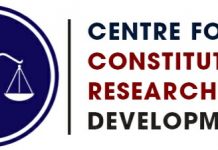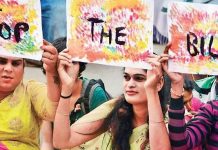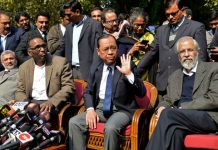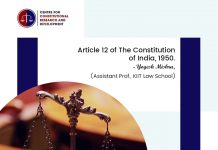History of NRC in Assam
The “National Register of Citizens” abbreviated as NRC is a record of the people which is maintained by the Central Government to identify the people dwelling in the Assam state and labelling them as the “legal citizens of the country.” The NRC traces its history back to the era of 1951 where the people belonging to the state had to prove that they lived in the state at that point of time or their names appeared in the electoral role before March 24, 1971. If they were able to prove any of these criteria, then they were deemed to be the “citizens of the country” unless they were declared to be a “foreigner,”[1] who came from the bordering areas of Bangladesh and Myanmar
The main reason as stated by the government, at both the state as well as the central level, to introduce the NRC was the Indo – Pak war of 1971 where the Pakistan Army was bought to its knees by the Indian Army when the latter captured around 93,000 prisoners of the former resulting in the liberation of Bangladesh (formerly known as East Pakistan). This resulted in the influx of people from Bangladesh into India in order to avoid the persecution happening in their native countries. For over years not only has there been influx of people from Bangladesh but also from other neighbouring countries like Pakistan and Afghanistan.
Issues with NRC in Assam
When the government came up with the idea of holding the exercise of NRC in Assam, people residing there were concerned of their status as to whether they would be the citizens of the nation or not, for the reason that the government set various criteria for the people to prove their identities. The government marked these people as “D Voters” or “Doubtful Voters” and in order to determine their status, constituted the “Foreigners Tribunals (hereinafter referred to as FTs)” by “The Foreigners Tribunals Order of 1964”[2]. The Order empowered these tribunals to adopt their own procedure to determine whether a person is a foreigner or not. This thereby implied that a procedure adopted by the FT named A would be completely different from the procedure adopted by the FT named B.
But over time, these tribunals exceeded their area of operation and started determining the nationality of a person which is, whether he is an Indian or not. The functioning of the FTs has been questioned on many grounds and the Amnesty International’s report on “DESIGNED TO EXCLUDE: HOW INDIA’S COURTS ARE ALLOWING FOREIGNERS TRIBUNALS TO RENDER PEOPLE STATELESS IN ASSAM” highlights the same. These grounds are:
-
Inexperienced Members Appointed to the Tribunals
Firstly, the members of the tribunals are appointed on a contractual basis and are trained only for a period of 4 days. The Assam government restricted the serving criteria (to determine the status of a person of being a foreigner or not) to retired district judges, additional district judges and advocates aged above 45 years or who have been involved in the legal practice for around 10 years.[3] The main flaw here is that the government appointed those people who didn’t have much knowledge about the ongoing crisis in Assam and the purpose for which the FTs were established as per the 1964 Order. The irony here is that the persons appointed to serve justice are however those who have no judicial experience. The extension of their tenure is merely determined by their performance i.e. the number of people they are able to declare as foreigners. Those members who declare people foreigners at the rate less than 10% are often threatened with severe consequences.
-
Insufficient Opportunity to Hear
Secondly, when a person is declared a foreigner by the Tribunal, then such petitioner is given only a period of 10 days to file a written statement and an additional period of 10 days to appear before the same tribunal with relevant documents. To the contrary, when the authorities are approached for the documents, they take around 4 months to provide the aggrieved people with the documents.[4] Also, only the certified and original copies are required to be produced and the photocopies of the same documents are not entertained by these bodies. In case of private documents such as marriage certificate and residence certificate, these documents are required to be produced by the issuing authorities themselves.
Since the burden of proof lies on the petitioner, the tribunals don’t issue summons to the concerned authorities for the presence unless the petitioner requests for the same. This also means that in case the petitioner is illiterate and unaware of the procedure, he is automatically deprived of the citizenship of the country even though all his documents might be in place or he has satisfied the required norms for claiming the citizenship.
-
Abuse of Power
Thirdly, the principle of “absoluteness of power” as adopted by these quasi – judicial bodies has a severe impact on the process of claiming citizenship as they selectively adopt the provisions of the Indian Evidence Act 1972 and abuse this power while rendering the decisions and by not providing written statements, deposition of witness etc. to the petitioner which are deemed to be necessary for approaching the higher courts. The impugned Order of 1964 also doesn’t provide for an unrestricted right to appeal. These bodies may reject the request of appeal in consultation with the District Magistrate (DM) if they don’t find any merit without even hearing the petitioner. Also, they don’t provide any guidelines as far as the content or nature of such “merit” is concerned, hence leading to further abuse and misuse of power.
- Insufficiency of Grounds in Declaring the Petitioner’s as Foreigner
Fourthly, these bodies declare a person a foreigner on petty grounds, one being the declaration of a person as a foreigner for not remembering the name of his grandfather’s voting constituency. In most of the cases these bodies have determined a person to be a foreigner ex – parte i.e. without the physical presence of a person or without even hearing his claim.
-
Denial of Citizenship on Excusable Errors
Fifthly, the minor variations in the age or name of the person also act as a major deterrence for the people who are claiming themselves to the citizens of the country. This may seem a little weird but the truth lies in it too. There is no doubt that there may be certain discrepancies even in the documents but at the same time, it is to be noted here that these discrepancies are not so major that they totally disregard the precious right of the citizens which they claim.
Justice Madan B. Lokur also pointed out that since a name could be written in many different ways, there can be no point to deny the citizenship to a person solely on this ground. He gave the example of spelling the name of a person by the name of “Mohammad”. He pointed out that since this name like many others can be written in many different ways this criterion is stretching the things too far.
-
Non Application of Res Judicata
Sixthly, the principle of “Res Judicata” doesn’t apply. This means that once a matter has been decided by a competent court, the same can’t be pursued by the same parties again before a competent court. But as the functioning of these bodies, as highlighted above, suffer from grave flaws, it is yet another major point of contention that is to be pondered upon. In May 2019 as in the case of Abdul Kuddus v. Union of India[5], the Supreme Court opined that once a person has been declared a foreigner or an Indian by the FTs, the same bodies can’t change their decision regarding the citizenship of the person. But the ground reality stays that this order of the Apex Court is not given any heed by these agencies of justice empowered with such an important task, as the same petitioners are facing trial “n” number of times thus making them suffer mentally, economically and socially.
This definitely points out the flawed procedure of determining citizenship in Assam and rather than being a process of determining citizenship, it is mainly a suffering for the people residing there.
Effect of CAA
-
Violative of the Equality Clause under the Indian Constitution
This situation has further aggravated with the introduction of Citizenship (Amendment) Act 2019 (hereinafter referred to as CAA). The making of this Bill and its passage on the President’s assent to be made into an Act has attracted nationwide protests. The CAA gives citizenship to six communities namely – Hindu, Sikh, Buddhist, Jain, Parsi or Christianity – belonging to the neighbouring countries of Pakistan, Afghanistan and Bangladesh[6]. These are predominately Muslim-majority countries where other religious communities face persecution, as the government says, but the big question that is to be put here is that is it only in these 3 countries that the religious persecution takes place?
Making and passing a law pertaining to only three neighbouring Islamic countries clearly discriminates on the basis of religion and is truly in violation of Article 14 of the supreme law i.e. The Indian Constitution, which grants equal status and protection to all the people within the territory of the country and prohibits any sort of discrimination either it be racial, religious, class, sect, gender etc.
Further it is to be noted that Pakistan, Afghanistan and Bangladesh are not the only 3 theocratic nations where religious minorities face persecution. The other theocratic states where religious minorities face persecution are Sri Lanka – Tamils, Hindus, Christians and Muslims; Nepal and Bhutan – Christians. Thus, if the act aims to give citizenship as pointed out in the SoR (Statement of Objects and Reasons), the amendment should definitely include these nations and government should frame the language of the act in such a way that all the religious minorities who face religious persecution will be given citizenship of India, irrespective of the state where they reside or whether the country has its own state religion or not.
-
Abating Pending Cases
The NRC was carried out to identify the illegal immigrants in the Assam and as per the Assam Accord which was signed in 1985, aimed at detecting, deleting, and deporting such people irrespective of the religion, 5.4 lakhs people have still been exempted as the CAA 2019 abates all pending cases relating to migration or citizenship against them.
-
Issue with Religious Persecution
The CAA makes 4 classifications as: (i) between Muslim migrants and Non-Muslim migrants from Afghanistan, Bangladesh and Pakistan (ii) between migrants from these three countries and from other countries (iii) between residents who migrated due to religious persecution and other forms of persecution e.g. racial persecution, ethnic persecution; and (iv) illegal migrants of 6 specified faiths from Afghanistan, Bangladesh and Pakistan who entered India before December 31, 2014 and those who entered India after December 31, 2014[7].
Privileging only a specific form of persecution i.e. the religious persecution over all other forms of persecution of minority communities is definitely arbitrary and discriminatory. Take the example of Ahmadi and Shia Muslims fleeing religious persecution in Pakistan or Hazara (Shia) Muslims from Afghanistan who are equally persecuted in consonance with these communities. The Muslims residing in Sri Lanka have increasingly felt the heat of rising Sinhala nationalism in their native country; Hindu Lhotsampas in Bhutan – who have suffered one of the worst forms of persecution and disenfranchisement with over a lakh people rendered stateless in the 1990s are also not covered.
Another major flaw that could be pointed out is that there is no reason to believe that all those illegal immigrants belonging to six communities as highlighted in the amendment who have come to India on account of religious persecution have really been the victims of such persecution. Has the government carried out an exercise to identify their cause of influx into the country whether it is on the account of economic, social, religious or cultural migration? Thus, the very premise which serves as the plank of this amendment lacks the judicial scrutiny.
[1] The Foreigner’s Act, 1946, No. 31, Acts of Parliament, 1946 (India)
[2] The Foreigners (Tribunal) Order, 1964, 1401 Gen. S. R. & O. 1, 2 (India).
[3] Amnesty International India, Designed to Exclude: How India’s Courts are Allowing Foreigners Tribunals to Render People Stateless in Assam, (23 December 2019).
[4] supra
[5] S Abdul Kuddus v. Union of India, (2019) 6 SCC 604 (India).
[6] The Citizenship (Amendment) Act, 2019, § 2
[7] Akanksha Jain, Four New Petitions Against CAA in SC, Says It Privileges Specified Religious Persecution, Live Law (20 December 2019, 2:30 PM), www.live law.in.













